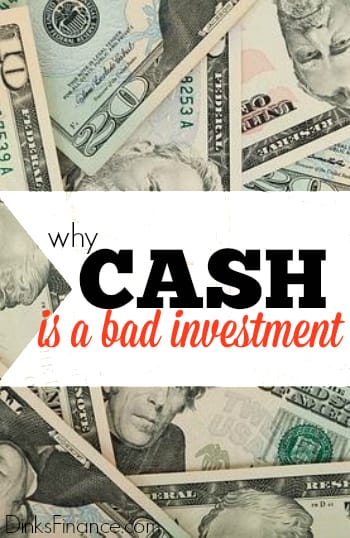Good morning Dinks. Let me ask you a question, do you have cash in your investment portfolio? I don’t mean if you have cash in a savings account I want to know if you have cash investments in your investment portfolio and retirement accounts.
As a financial planner my job is to make sure clients have the absolute best investment options for their type of risk tolerance and investment knowledge. December 31st marked the end of the year and the end of the last quarter for 2014. That means right about this time people all across the country are receiving their annual investment account statements, they’re looking at the rate of return and they’re calling their financial planner.
Did your investments underperform in 2014?
This is my ultimate pet peeve as an investment professional, but unfortunately it’s also my reality. Very often people put money in their investment portfolios and don’t initially invest it (for any number of reasons) until they realize cash doesn’t pay a lot of interest – then they call to make a complaint.
Of course I would like to say “But Mr. Client you didn’t have time to listen to my investment recommendations back in July and you haven’t answered my phone calls since, that’s why we placed your money in cash and that’s why you have a 1% rate of return.” But of course I can’t say that so I listen to them complain and try to book another appointment for them to come and see me to chose a better investment option.
Avoid cash at all costs, except in savings
The truth is anything is better than putting money in cash – cash is never a good investment. There are several near-cash investments on the market that people can choose to put their money in until they actually decide how they want to invest their money. A high interest savings deposit a.k.a. cash does pay some interest, but it’s definitely not a lot. Cash is also not an investment option it’s just a parking spot for your money until something better comes around.
Money is personal; how you want to invest your money is probably different than me, right? This is where the advice of an investment professional comes in. There’s an investment option out there for everyone and a financial planner can help find the best investment option for YOU.
Cash alternative: Money Market Investments
Investopedia describes a Money Market Fund as “An investment whose objective is to earn interest for shareholders.” Money Market Mutual Funds generally invest in very low risk (but not guaranteed) investments such as high-quality investments issued by governments and corporations, including treasury bills, bankers’ acceptances, and commercial paper.
What does that mean? It means you won’t have a very high interest rate if you invest in Money Market Mutual Funds, but you won’t have to lose sleep over a high risk investment either. These types of low risk investments are usually good for short term goals i.e. if you plan to use the money within a year but still want to earn some type of monthly income. They aren’t ideal for long term investments such as retirement accounts because no one wants a low interest rate over several years.
Cash alternative: Bond Mutual Funds
I’m not a high risk investor. I’m 34 years old and I invest in Bond Mutual Funds in my retirement account. Why? Because I am willing to accept small fluctuations in the value of my investments and I want to invest in something that can give me a decent rate of return over the long term. I am not one of those people who is looking for 10% rate of return. Why? Because I don’t want to take the risk associated with those types of investments.
I’m a balanced investor, I like a nice 50/50 split between security of capital and potential rates of return. What does that mean? It means I don’t want to keep my money in cash and earn next-to-no interest but I also don’t want to risk it all by putting my money in extreme high risk investments. I work hard for my money and I’d like it to be there in retirement.



At one time about a decade or more ago, you could get a nice return simple in money markets or CDs but no more. This has decimated the income for many elderly people who can’t or don’t want to invest in anything even slightly more risky. So many of them who grew up during the depression have such a distrust of the stock market, they will not invest there and they have seen their interest income take a huge hit.
Interesting…I think that one thing traditional money managers seem to forget is that keeping large amounts of cash lets you take advantage of opportunities as they may arise.
For example, I’m sure a lot of you remember Deep Water Horizon oil spill in the Gulf of Mexico. BP stock took a beating after the spill, but its since recovered. If you had cash to invest, you’d have been in a good position to take advantage of the momentary dip in the value of the company.
Pingback:Are you holding too much cash? - DINKS Finance | DINKS Finance
Pingback:How I Grew My Net Worth in 1 Year - DINKS Finance | DINKS Finance